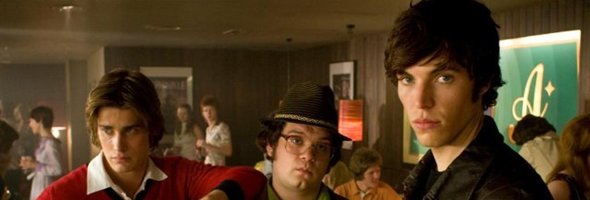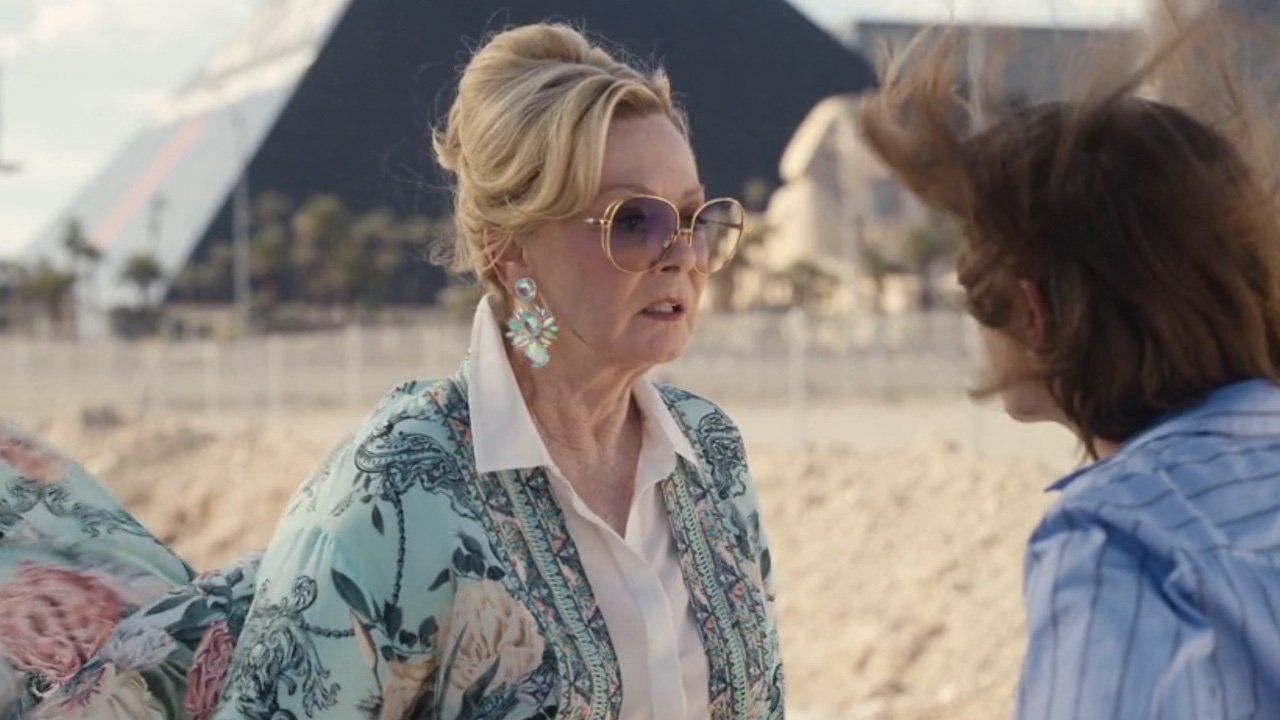It's getting to the point where I'm no longer biting my nails in anticipation whenever Ricky Gervais releases a new slice of media. I should have recognized that my glorified fandom for him had at least that far to fall. While I find nothing wrong with any short-form projects he has, as in television and radio, I can't name a single film he was involved in that didn't make me cringe at least as often as I laughed. Well, actually, I liked Ghost Town more than I thought I would, but The Invention of Lying will forever be an exercise in aggressive boredom. Still, I allowed a margin of error when I heard about Cemetery Junction, because it avoids the stench of Hollywood. Unfortunately, it also avoids the excitement and storytelling of Hollywood. It's England in the 1970s, and boys will be boys. That's the quickest way to sum up this movie, but it doesn't do enough injustice. The title refers to an area of Reading, Berkshire, where most of the film takes place. There is a negative stigma associated with this place. It's totally blue collar, and is that what you want to do your whole life? Work in a factory...with the other factory workers? Whoa, sorry. I just turned into one of the film's snooty adults who only want to destroy the fun and freedom of the local youth. Or wait, maybe they're pushing the youth pretty hard, but they're pushing them in the right direction. A lot of Cemetery Junction works within this generational argument but doesn't present it any differently from a hundred other similar films.
Freddie (Christian Cooke), Bruce (Tom Hughes), and Snork (Jack Doolan) are a trio of shit-talking, beer-drinking, girl-chasing lads. Freddie is the perfect-hair pretty boy, earning his wages in a factory with Bruce, a watered-down Sid Vicious with daddy issues. Snork (called so because of his resemblance to the Banana Split character) is an announcer at a train station; his plot involvement is centered on an inability to impress females. Freddie's home life consists of a blue-collar dad (Ricky Gervais), a starched-collar mom (Julia Davis), and a rebellious grandmother (Anne Reid), none of whom add much more than reliable family acting and some hammy laughs.
Things could continue on in aimless stasis, and Bruce and Snork would be fine with that. However, Freddie doesn't want the same dead-end life that everyone around him has settled into. He sets himself up in the exciting world of insurance, working for a company run by Mr. Kendrick (Ralph Fiennes). As it happens, Kendrick's daughter, Julie (Felicity Jones), is an old schoolmate of Freddie's, one he has unresolved feelings for. Unfortunately, she's dating Mike (Matthew Goode), the insurance rep showing Freddie the ropes. That's highfalutin drama right there. Especially when you take into account just how dead set Bruce and Snork are against changing their lives for the "better."
Gervais, who co-wrote and co-directed with longtime pal Stephen Merchant, said the film is a post-coming-of-age tale inspired by his own youth. To that I can only say I hope he doesn't often mine this material. Cemetery Junction does have many merits going for it, despite my naysaying attitude. The film easily pulls off the look of the 1970s. The actors all appear to be doing what they're supposed to. There is a wealth of bit players from The Office and Extras, including a silly cameo from Merchant himself. Fiennes is especially good, appearing proudly aloof, floating high and mighty above his wife, played with masterful primness by Emily Watson. There's a solid soundtrack behind everything, even if it's music I don't particularly care for. The story itself is old hat, but beneath the surface there is a stronger film that could have been made. Instead, a lack of depth is present everywhere.
I know that I'm not the most appropriate person to judge anything dealing with class structure. I have middle-class bones and have become vaguely comfortable with the fact that this is my place in life. While I can understand the motivations that come with wanting to succeed, Frankie doesn't exude any of the promise or capability. He's pushing himself to be an insurance salesman based on an arbitrary need to achieve, a need that causes him to alienate his friends all throughout the movie. As Frankie and Julie rekindle their old friendship, she puts the idea in his mind that there is an entire world open for him to voyage. This bit of knowledge slowly morphs Frankie's goals, making them less an issue of class and more one of self-reward.
Details like that would be easy to accept if it weren't impossible to care about these three dullards. Frankie, despite his James Dean look and big dreams, isn't really that cool of a guy. After all, he hangs around with Bruce, who would rather get fucked up and antagonize policemen instead of having fun that doesn't land him in jail. But he's an arrogant shit, so I hope he ends up rotting in a cell long after the credits have rolled. The film's most engaging scene involves him being yelled at by a police sergeant played by the ace Steve Spiers. Snork could almost come off as sympathetic, because he's chubby, wears glasses, and doesn't have a snobbish bone in his body. But his dialogue is boring, and even though he has a big showcase scene as a shirtless singer, the moment is ruined by a truly gratuitous use of the "c-word," which can be amazingly funny in Gervais' mouth, but which here comes off limp and trite. How often can you call the word "cunt" trite? And it's not even the only deflated bit of dirty humor at play here.
After all that, is it even worth bringing up the uselessness of Matthew Goode? Nah. I wish that Cemetery Junction spoke to me on an emotional level, because I know that some people think it's a wonderful film. I don't think anyone can properly call it unpredictable, but it does hit all the notes that it needs to, just with little force. We barely see Frankie succeed at selling insurance, yet he's soon invited to a very important get-together reserved for high sellers; it isn't the clearest stream of action. Incidentally, this scene has the best moment in the movie, given by Mr. Kendricks to a retiring worker; it's hilariously uncomfortable. Fiennes and Watson should have been the major players here. If that hurts the movie's plot, it won't hurt my feelings. I know I'll look at the clock a lot less.
Gervais is going to win me over one day without using uncomfortable humor, but until then, I'm saving his films for the rainiest of days. I'll just relisten to the always-wonderful podcasts, but without the tacky animation HBO added to it. I'm not blaming you for that, Rick. Glory be, this film has two commentary tracks on it. Thankfully, one of them consists solely of Ricky Gervais and Stephen Merchant, as entertaining and giggly as they usually are. They sell the film better than the film itself does. I understand more of the intentions and I can release respect the film more than I did. I could probably listen to these two commentate on Arena Football, even if it means watching Arena Football. The second commentary features the three male leads, and I honestly dreaded hearing it but was pleasantly surprised by how it flowed. It's almost more detailed than the directors', but it carries the same youthful jubilance that stays mostly captivating.
"The Directors: A Conversation with Ricky Gervais and Stephen Merchant" is as funny as the commentary without being redundant. Essentially, it's the same as any other film, but with an earnest charm that exceeds the usual horn-tooting directors often spout. The same can be said of "The Lads Look Back: The Stars Discuss Cemetery Junction," which sits Cooke, Hughes, and Doolan together as they talk about the parallels between the filming and the eventual friendship that grew between them, among other things. Both of these are interesting for their respective 10-minute runs.
Fourteen minutes of 10 deleted scenes actually manage to top any random 14 minutes in the film, though some are just extended scenes already there. Most of them are funny, especially ones with Gervais and character actor David Earl, who also rocks out his un-deleted scenes as a diner owner. He's also prominent in my favorite part of any Gervais project: The Blooper Reel. It's about six minutes of Gervais making himself laugh and seven minutes of others making him laugh. It's infectious.
In fact, all of these features presented to me a damned good time on a damned good film. I just didn't catch that one, I guess. One thing's certain: Cemetery Junction, through its features, actually becomes worth the purchase. I haven't had that opinion many times, but I feel it's justified, especially if you whole-heartedly dug the movie. It's nice knowing that there's something there for everyone else, too.

Nick is a Cajun Country native and an Assistant Managing Editor with a focus on TV and features. His humble origin story with CinemaBlend began all the way back in the pre-streaming era, circa 2009, as a freelancing DVD reviewer and TV recapper. Nick leapfrogged over to the small screen to cover more and more television news and interviews, eventually taking over the section for the current era and covering topics like Yellowstone, The Walking Dead and horror. Born in Louisiana and currently living in Texas — Who Dat Nation over America’s Team all day, all night — Nick spent several years in the hospitality industry, and also worked as a 911 operator. If you ever happened to hear his music or read his comics/short stories, you have his sympathy.
Hacks Went Back To Vegas, And It Made Me Miss The Old Seasons For One Big Reason
Tom Cruise's Running Style In The Mission: Impossible Films Is Iconic, And Apparently, It's Connected To One Of His Outsiders Co-Stars
Somebody Actually Used It’s Always Sunny In Philadelphia’s Musical To Propose, And It’s Weirdly Sweet











